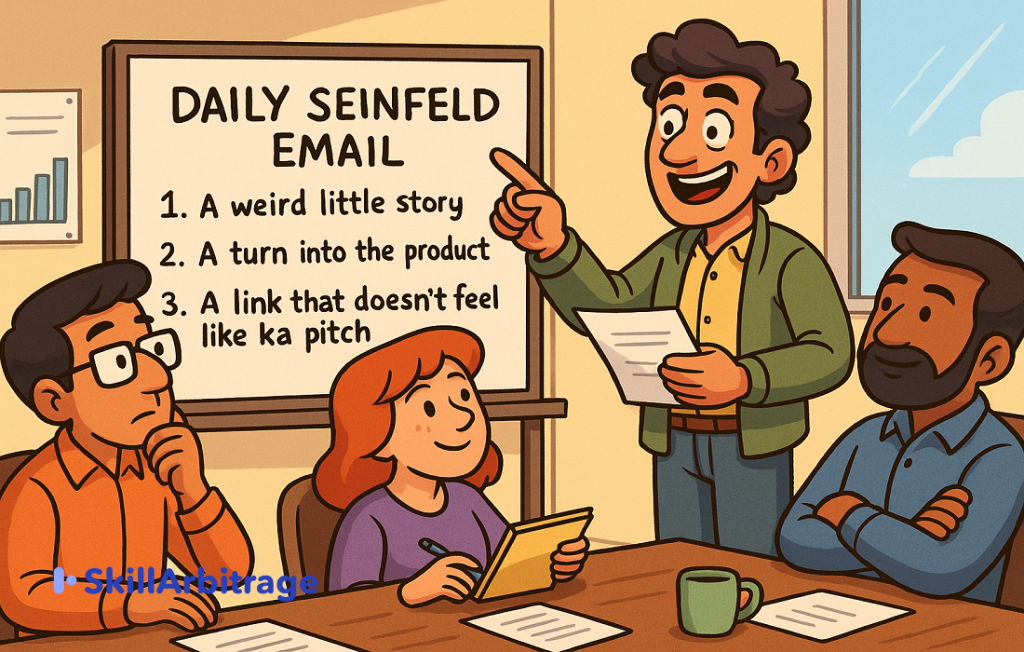This article reveals how “Daily Seinfeld Emails” can turn everyday observations into daily sales, and how smart freelancers can offer it as a high-retention service founders never want to cancel. If you want daily monetization and recurring clients, start here.
Table of Contents
Previously in Soap Opera…
Harsh taught Swathi how the Soap Opera Sequence hooks new subscribers with emotion-driven cliffhangers and boosts Tantra’s email retention. This time, he shows her how to keep that attention alive and monetized with Daily Seinfeld Emails. The lesson: bonding beats teaching, and stories sell better than strategies.
(Continued…)
Swathi stepped into the Tantra conference room and immediately smelled trouble. Not real trouble. Just, Harsh trouble. He was seated at the far end, grinning like a startup founder who just hit a vanity milestone. Raja lounged on the side table with a paper cup of chai. Savitha was beside him, scribbling something in her Moleskine.
Harsh spun his laptop around before Swathi could speak. Open on the screen: a chart with upward curves. Retention metrics. Completion rates. Click-throughs.
Tantra’s email list was finally breathing.
Harsh tapped the screen, triumphant. “They’re reading. They’re clicking. They’re finishing the soap opera sequence.” He looked at Swathi like he expected confetti to fall from the ceiling.
Swathi nodded, arms crossed. “Nice. So what’s next?”
Harsh leaned back, smug. “You tell me.”
She gave him a look. “You got me in here so you could pitch me, didn’t you?”
Harsh grinned wider. “Of course I did. You know I only schedule meetings when I’ve got something dangerous.”
Swathi rolled her eyes. “Alright, go on.”
Harsh stood and started pacing, which meant he was about to make up metaphors on the fly.
“The SOAP sequence worked because it was a story. People want to know what happens next. But here’s the thing, stories like that end. You can’t send Season 2 of the same drama. You can’t fake a hero’s journey every week. Eventually, you run out of heartbreaks and cliffhangers.”
Raja nodded from the corner. “Same reason every web series sequel flops. The structure’s too heavy. You can’t carry that weight forever.”
Harsh pointed. “Exactly. And that’s the real problem.”
He turned to Swathi. “Tantra’s top-of-mind when we have something big to say. A new scent. A new offer. A new drama. But what about all the days in between? That’s when we vanish. That’s when customers drift. Not because they stopped liking us. But because we stopped talking.”
Savitha looked up from her notebook. “You’re talking about churn.”
“Not just churn,” Harsh said. “Memory decay. Attention slip. The gap between two big campaigns is where the brand starts to fade. That’s the real enemy. It’s not silence. It’s slow forgetting.”
He paused, letting the weight of that land.
“Which is why we need emails that don’t need a reason to exist.”
Swathi raised an eyebrow.
“Emails about nothing,” Harsh said. “But not really nothing. I mean the Seinfeld kind of nothing. Everyday stuff. Tiny stories. A rickshaw ride. A perfume spill. Your cousin’s wedding. Stuff that feels like life but always has a thread back to Tantra.”
Raja smirked. “Like, ‘I burned my shirt today and realized something about sandalwood’?”
“Exactly,” Harsh said. “No arc. No tension. No sales pitch. Just presence. And when you show up every day like that, friendly, curious, honest, they start liking you. Not the product. You. And when that happens, buying again doesn’t feel like a decision. It feels like continuing the relationship.”
Savitha looked thoughtful. “So we’re not chasing conversions every day. We’re protecting the bond.”
Harsh nodded. “We built drama with SOAP. Now we maintain intimacy with Seinfeld.”
Swathi didn’t speak for a long moment. Then she smiled, slow and sideways.
“Wait. Seinfeld? Like the show? The comedian? What’s he got to do with my email list?”
Raja chuckled. “Finally. I was waiting for someone to ask that.”
Harsh lit up. This was his favorite part.
What is the Daily Seinfeld Email?
“Look, Seinfeld was a show about nothing. No plot. No big themes. Just four weirdos in New York talking about cereal, dating, soup, and parking tickets. And yet, people watched it every week for nine years. Religiously.”
Swathi raised an eyebrow. “So you want Tantra to become a sitcom?”
“No. I want Tantra to feel like a friend. Like someone who shows up every day, tells you something oddly specific, makes you smile, and leaves before they get annoying.”
He paused, letting it sink in.
“People don’t unsubscribe from people they like. Even if they’re not buying. Even if they’re not ready. They stay. Because it doesn’t feel like marketing. It feels like connection.”
Savitha leaned in. “So the emails aren’t about perfume?”
Harsh grinned. “They’re about Swathi. They’re about Tantra’s world. The chaos, the beauty, the scent leaking in your handbag, the auntie who said something wild at the family lunch. And somewhere in there, you link it to what we sell. Not by force. Just by presence.”
He opened his notes app. “Let me show you how it works.”
Why you need the Daily Seinfeld Email
Harsh pulled out his phone and tapped through a few notes. “There’s a reason this works,” he said. “It actually started with Russell Brunson. You know, the guy who came up with the Soap Opera Sequence.”
Swathi nodded slowly. Raja looked unimpressed. Savitha was already taking mental notes.
“Brunson ran into a wall,” Harsh said. “After the Soap Opera Sequence, he thought he had it figured out. He kept sending these detailed, high-effort, content-rich emails. Value bombs. Guides. Teaching. But engagement dropped. People stopped opening. Stopped clicking. The numbers just… dipped.”
Swathi frowned. “But wasn’t that the whole point? Teach, build authority, sell?”
“Exactly,” Harsh said. “That’s what he thought too. But he missed one thing. After the Soap Opera Sequence, people didn’t want more teaching. They didn’t sign up for class. They signed up for him.”
Raja leaned back in his chair. “So the persona became the product.”
“Yes,” Harsh nodded. “Brunson realized that once people connected with his voice, his personality, his weird metaphors and stories… they stopped caring about the information. They just wanted to hear from him. The relationship mattered more than the lesson.”
He paused, then added, “That’s the mistake most brands make. They think email is a course. But it’s not. It’s a couch.”
That caught Swathi’s attention.
“A couch?”
“Yeah,” he said. “You’re not standing at a whiteboard teaching. You’re slumped on a couch, talking about your day. And the people who stick around? They’re the ones who like you. Not your bullet points.”
Swathi glanced at Savitha, who was smiling like she’d just seen a new color. Then she turned to Harsh. “Alright. So if Soap Opera makes them stay, Seinfeld makes them want to stay.”
“Exactly,” Harsh said. “No more value bombs. Now it’s sitcom energy. Every email just one more reason to like you.”
How is the Daily Seinfeld different?
Harsh turned his phone around so they could see the screen. A rough sketch of an email outline sat there: 90% entertainment. 10% content. 100% tied to an offer.
“Brunson flipped the whole damn format,” Harsh said. “Stopped waiting for big ideas. Stopped trying to be profound. He just started showing up.”
He pointed at the outline again. “Daily. Casual. Like a personal blog that lands in your inbox.”
Swathi leaned forward, reading. “So what, he just wrote about his day?”
“Exactly. One email, one story. Maybe it was about his kid throwing cereal at the ceiling. Or a flight delay that made him miss an event. Or a dumb thing he said to his wife. And then…” Harsh snapped his fingers, “…he’d find some way to tie it back to the offer. Even if the link was thin.”
Savitha laughed. “That sounds unhinged.”
“It was unhinged,” Harsh grinned. “But people loved it. Because they weren’t reading to be educated. They were reading to feel like they were part of his life.”
Raja raised an eyebrow. “So the sale hides inside the story.”
“Yeah,” Harsh said. “It doesn’t interrupt the story. It is the story.”
Swathi sat back. “So instead of planning out lessons, we let the brand be… human.”
“Not just human,” Harsh said. “Weird. Opinionated. Overheard-at-a-party level casual. That’s what sticks in people’s minds. Not another ‘here are 3 tips to boost retention’.”
He tossed a pen on the table. “You already did the bonding. The Soap Opera Sequence worked. Now they want to hear from Swathi. Not Teacher Swathi. Not CEO Swathi. Just… Swathi in her bathrobe, ranting about some nonsense that happened at the perfume warehouse. And then, oh look, there’s a link to the new scent.”
Swathi shook her head, smiling. “God help us all.”
Structure of the Daily Seinfeld Email
Harsh scribbled three lines on the whiteboard:
1. A weird little story
2. A turn into the product
3. A link that doesn’t feel like a pitch
“Seinfeld Emails live and die on structure,” he said. “The story isn’t random. It’s the trojan horse.”
He tapped the first line.
“Start with something real. Mundane but sharp. A daily screw-up. A shower thought. Something that happened in the lift. Stuff no ‘real’ brand would ever email about.”
Savitha raised her hand, mock-serious. “Like the time Swathi spilled jasmine oil on her only pair of white jeans and made the whole warehouse smell like a haunted temple?”
“Perfect,” Harsh said. “That’s gold. You open the email with that. Tell the story. And then, ” he drew a big arrow, “, you turn.”
Swathi squinted at the board. “Turn into what?”
“The product. Or the offer. Or the problem the product solves. Doesn’t have to be clean. Doesn’t have to be clever. It just has to connect.”
He wiped his hand on his jeans and started talking like he was inside an email.
“So yeah, now the warehouse smells like the ghost of my grandmother. But weirdly? That’s the risk of working with raw ingredients. And that’s why we never compromise on source purity. Our new Night Blooming Jasmine mist? Same oil. No shortcuts. Link below.”
He turned back to them.
“See? No teaching. No preaching. Just a story, a turn, a click.”
Raja scratched his chin. “So the story is the warm-up. The link is the punch.”
“Exactly,” Harsh said. “And the CTA shouldn’t feel like a detour. It should feel like the next sentence.”
He pointed to three quick examples written under the structure on the board:
– Story: Found a used perfume bottle in my cab. Opened it. Worst mistake of my week.
→ Turn: That’s when I realised why we never use synthetic musk.
→ CTA: Try the all-natural version here.
– Story: My phone auto-corrected ‘Tantra’ to ‘Tantrum’ in a client email.
→ Turn: Honestly? Not far off. Launch week is chaos.
→ CTA: Want to see what all the tantrums are for? Peek the new line.
– Story: Caught my dad secretly using my perfume again.
→ Turn: This scent was supposed to be for women. Turns out, desire doesn’t care about labels.
→ CTA: Unisex and unapologetic. Shop it now.
Swathi was already taking notes.
“This,” she said, “is going to piss off every luxury brand consultant I know.”
Raja smiled. “Which is why we’ll win.”
Why the Daily Seinfeld Email works
Harsh leaned back against the whiteboard, arms folded, letting the silence breathe. Then, quietly, like he was reading from some ancient scroll of email secrets:
“You know why this works?”
Raja tilted his head. Swathi rolled her eyes. Savitha mouthed, “Go on, Socrates.”
He pointed to the air like he was painting banners in midair.
Bonding beats teaching.
“Once they like you, they don’t need lessons. They need signs you’re alive. Like a friend who sends memes just to say, ‘Hey, I saw this and thought of you.’ These emails are that meme.”
Swathi nodded, slowly.
“They signed up for Tantra. They stayed for Swathi.”
Harsh grinned.
Entertainment scales better than education.
“You can’t keep dropping marketing frameworks every day like Gandalf. But you can tell them your intern burnt incense in the conference room and triggered the fire alarm. That scales.”
Savitha laughed. “True story.”
The story IS the pitch.
Harsh stepped closer. “If the story’s good, the product doesn’t feel like a push. It feels like a punchline. Or a solution. Like…”
He snapped his fingers.
“…like the moral of a fable. Not ‘buy this,’ more like, ‘so here’s what I learned, and if you’ve ever felt the same, here’s something that helps.’”
Swathi scribbled that line down.
“And finally,” he said, holding up a single finger…
Daily frequency creates revenue compounding.
“This is the part most people don’t believe. The more he emailed, the more they bought. Because daily stories = daily trust = daily clicks.”
He pointed at a chart on the screen. Daily email volume vs. weekly sales. A steep, jagged climb.
“It wasn’t the sales pages. It wasn’t the funnels. It was the fact that they missed him when he skipped a day.”
Raja tapped the table. “So you’re saying attention compounds like money?”
Harsh smiled. “Only if you keep showing up like someone they’d miss.”
Things to rmember
“So what do we take from all this?”
He didn’t ask rhetorically. He asked like a maths teacher just before flinging chalk at your head.
“Email daily,” he said. “After your Soap Opera Sequence ends, don’t vanish. That’s like going silent after a first date. Weird.”
Raja laughed. Swathi smirked.
“Don’t wait till you have something grand to say,” he went on. “What’s grand to you may be boring to them. And what’s mundane to you may be gold to them.”
He paused.
“Like, last week I sent an email about how I found a dead lizard behind the Wi-Fi router. That email sold 41 moisturisers.”
Savitha blinked. “Wait, how?”
He shrugged. “Tied it back to ‘what’s rotting behind your beauty routine?’ It doesn’t need to be logical. Just personal.”
He walked to the whiteboard and wrote in caps: OBSERVE → CONNECT → OFFER.
“Seinfeld made entire episodes about parking spots and soup. We make emails.”
Swathi was typing now. Fast.
“Entertain first, sell second,” Harsh said, looking straight at her. “But always sell. Otherwise it’s just a diary.”
“Got it,” she murmured.
“And don’t make stuff up,” he added. “You’re not writing fiction. You’re making connections. Real wins, real mistakes, real weirdness. That’s what hooks people.”
Finally, he tapped the board with the pen and said:
“None of this works unless they like the person behind the keyboard. That’s why the Attractive Character matters. Not just what you say, but how you say it. The little obsessions. The voice. The rhythm. That’s the glue.”
Freelance goldmine hidden in the inbox
Raja leaned back in his chair, eyes narrowing. He wasn’t thinking like a brother. He was thinking like a freelance strategist staring at a license to print money.
“So,” he said slowly, “let’s say someone’s not running a perfume brand. Just writing for clients. You’re saying these emails can be… productised?”
Harsh didn’t skip a beat.
“One hundred percent. Especially now.”
He started counting on his fingers.
“Client already has a product. You just need to bond their persona with the audience. So you:
- Write one onboarding Soap Opera Sequence to kick off.
- Then switch to Daily Seinfeld Emails for ongoing monetisation.”
He looked at Savitha.
“You don’t need a giant list. You just need a list that likes the sender.”
Savitha frowned. “But daily? Isn’t that too much for most freelancers to promise?”
“Not if you batch it. Or sell it weekly with templates. Or turn it into a newsletter-style retainer. Call it ‘Inbox Diary.’ ‘CEO Voice.’ Whatever makes it feel like a direct line to the founder.”
Swathi was grinning now. “You mean freelancers could literally offer a service where they become the voice inside the founder’s head?”
Harsh nodded. “Exactly. It’s not content. It’s connection. And most brands don’t have the time or personality clarity to write this way. But if you do the bonding well up front, readers don’t expect brilliance. They just want you. Or the best version of them that you’re channeling.”
Raja looked at Swathi, then at Harsh.
“So the funnel is: write Soap Opera to build the relationship. Then Seinfeld to keep it alive. And in every email, no matter how small the story, you sell.”
Harsh smiled. “Yup. Welcome to the most reliable freelance email offer in the game. Low churn, high retention, scalable, and built on the one thing AI still fumbles. Personality.”
Savitha sipped her coffee, raised her eyebrows, and muttered:
“Maybe I should be writing these.”
Swathi leaned back, arms crossed, smirking. “Since you’re squatting in my office every day anyway, you might as well write these for me.”
Harsh blinked. Then grinned. “Was that a ‘yes’?”
“Don’t make me say it twice.”
Raja threw up his hands in mock betrayal. “Unbelievable. My own sister ignored me when it was time to give out a freelance job!”
Savitha laughed. “Relax, Raja. You’ve already got six other side quests going on.”
Harsh opened his laptop, already jotting ideas. “Don’t worry. I’ll make sure each email ends with a plug for your emotional recovery.”
Swathi shook her head, smiling. “Fine. Just don’t quote me saying anything sentimental.”
Too late. Harsh was already typing.
The Daily Seinfeld Era at Tantra had begun.
(To be continued…)







 Allow notifications
Allow notifications
